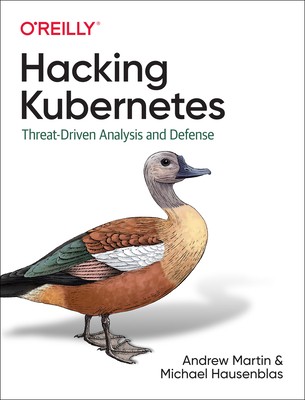
- We will send in 10–14 business days.
- Author: Andrew Martin
- Publisher: O'Reilly Media
- ISBN-10: 1492081736
- ISBN-13: 9781492081739
- Format: 17.8 x 23.3 x 1.7 cm, minkšti viršeliai
- Language: English
- SAVE -10% with code: EXTRA
Reviews
Description
Want to run your Kubernetes workloads safely and securely? This practical book provides a threat-based guide to Kubernetes security. Each chapter examines a particular component's architecture and potential default settings and then reviews existing high-profile attacks and historical Common Vulnerabilities and Exposures (CVEs). Authors Andrew Martin and Michael Hausenblas share best-practice configuration to help you harden clusters from possible angles of attack.
This book begins with a vanilla Kubernetes installation with built-in defaults. You'll examine an abstract threat model of a distributed system running arbitrary workloads, and then progress to a detailed assessment of each component of a secure Kubernetes system.
- Understand where your Kubernetes system is vulnerable with threat modelling techniques
- Focus on pods, from configurations to attacks and defenses
- Secure your cluster and workload traffic
- Define and enforce policy with RBAC, OPA, and Kyverno
- Dive deep into sandboxing and isolation techniques
- Learn how to detect and mitigate supply chain attacks
- Explore filesystems, volumes, and sensitive information at rest
- Discover what can go wrong when running multitenant workloads in a cluster
- Learn what you can do if someone breaks in despite you having controls in place
EXTRA 10 % discount with code: EXTRA
The promotion ends in 23d.13:02:03
The discount code is valid when purchasing from 10 €. Discounts do not stack.
- Author: Andrew Martin
- Publisher: O'Reilly Media
- ISBN-10: 1492081736
- ISBN-13: 9781492081739
- Format: 17.8 x 23.3 x 1.7 cm, minkšti viršeliai
- Language: English English
Want to run your Kubernetes workloads safely and securely? This practical book provides a threat-based guide to Kubernetes security. Each chapter examines a particular component's architecture and potential default settings and then reviews existing high-profile attacks and historical Common Vulnerabilities and Exposures (CVEs). Authors Andrew Martin and Michael Hausenblas share best-practice configuration to help you harden clusters from possible angles of attack.
This book begins with a vanilla Kubernetes installation with built-in defaults. You'll examine an abstract threat model of a distributed system running arbitrary workloads, and then progress to a detailed assessment of each component of a secure Kubernetes system.
- Understand where your Kubernetes system is vulnerable with threat modelling techniques
- Focus on pods, from configurations to attacks and defenses
- Secure your cluster and workload traffic
- Define and enforce policy with RBAC, OPA, and Kyverno
- Dive deep into sandboxing and isolation techniques
- Learn how to detect and mitigate supply chain attacks
- Explore filesystems, volumes, and sensitive information at rest
- Discover what can go wrong when running multitenant workloads in a cluster
- Learn what you can do if someone breaks in despite you having controls in place


Reviews